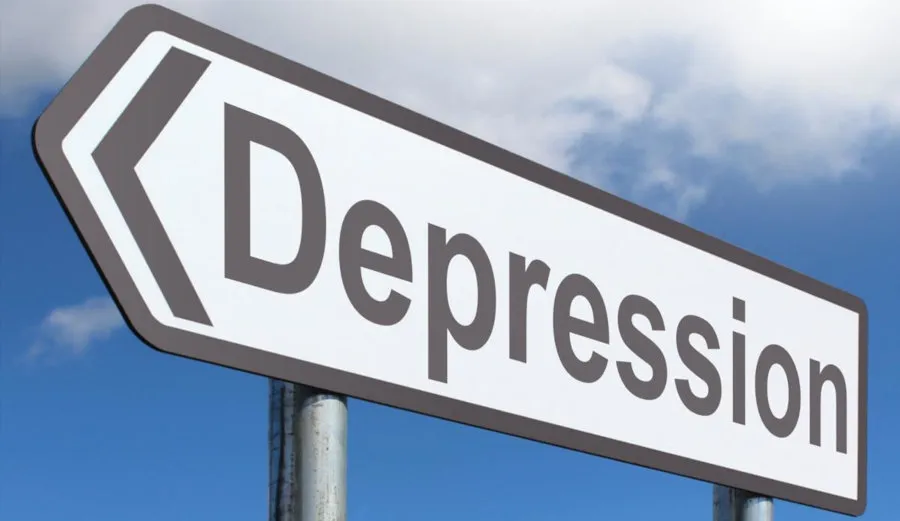No, this is not an article about economic depression, although that kind of depression is intimately linked to the capitalist economy as well. This post is about the mental state known as depression, and how capitalism is causing this mental state in an increasing number of people, mostly the young.

source: Picpedia.org
It's true that this year has been exceptional in the sense that the corona pandemic and its resulting lock-downs have greatly increased social isolation ,and with it depression. But even before covid-19 mental illness was on the rise, as well as suicide numbers caused by depression, most prevalent among young adolescents. It's strange, that in a time when we've built a world with greatly increased interconnectedness, we also suffer from increased social isolation, alienation and loneliness. Well, strange if we don't listen to the words spoken by both Karl Marx and Adam Smith about capitalism. Although these are ideological adversaries, they both warned, in their own times and in their own words, about the danger of alienation, the erosion of mental agility and creativity among the participants in the capitalist economic model.
Major depression is on the rise among Americans from all age groups, but is rising fastest among teens and young adults, new health insurance data shows. [...] “There’s a lack of community. There’s the amount of time that we spend in front of screens and not in front of other people. If you don’t have a community to reach out to, then your hopelessness doesn’t have any place to go.” Kids and young adults, especially, feel rushed and pressured.
source: NBC News - May 10, 2018
Even though depression is a mental illness, that doesn't mean there are no real-world causes or correlations related to it. While we can explain depression in pure biological terms, as an imbalance in certain body- and brain-chemicals, neurons and the likes, there's no denying that social relations as they are shaped by the way our societies are structured also have a large impact on those balances, and as a result on the state of our mental health. And our overarching socioeconomic structure is that of capitalism. Some will persist that it's not capitalism, but monopoly-capitalism or neoliberalism or crony-capitalism, but those are all different words for the same thing, which is late stage capitalism; capitalism's fundamentals can only result in monopolies and a small minority of filthy rich individuals, for there is no invisible hand.
So, how does capitalism influence our mental state to be the cause of much increased depression? To answer that question I'd like to introduce you to the works of Jewish-German social psychologist Erich Fromm. He was a member of the prestigious Frankfurt school of thought in Germany who expanded on Freud’s ideas of libido, and combining them with Marx's ideas about "fixed" and "relative" drives behind people's actions, he used his unique synthesis of these ideas to develop his theories. Fromm formulated eight basic human needs that are necessary to live a happy and full life: relatedness, transcendence, rootedness, sense of identity, frame of orientation, excitation and stimulation, unity, and effectiveness. The first five of these are discussed in the below linked video, as well as the way in which capitalism prevents these needs to be fulfilled. Right off the bat we can see that capitalism makes all of us each others' competitors, which is a good first step towards social isolation. Sure, we all need a sense of identity, we need to be allowed to be our own person, so there's no problem with individuality. But don't confuse individuality with individualism: while individuality is amping up the things that are uniquely ours, individualism is the culture where we are separated from the whole and forced to see ourselves as separate, a culture that is readily apparent everywhere from Instagram profiles to salary negotiations.
The generations born after the fall of the Berlin Wall and the demise of the U.S.S.R. have never known anything else than capitalism, global capitalism even, and have been raised under the worldwide ideology of individualism. They work part-time jobs in the gig-economy and have no sense that society is there for them and they leave school with a mountain of student debt. I'm old, so I grew up when school was free, or cost so little that it could be paid for with a summer-vacation job or two, yet it is my generation that blames these younger generations for being whiny little kids who don't know how good they have it... That's stupid and shows a complete failure of understanding the unique pressures, for a great part caused by late stage capitalism, under which these youngsters have to create their own place in this world. To those people of my age (fifty-plus) I'd like to extent an invitation to watch this video, and also to the rest of you of course, dear readers; I hope you like it :-)
How Capitalism Causes Depression
Thanks so much for visiting my blog and reading my posts dear reader, I appreciate that a lot :-) If you like my content, please consider leaving a comment, upvote or resteem. I'll be back here tomorrow and sincerely hope you'll join me. Until then, keep safe, keep healthy!

Recent articles you might be interested in:

Thanks for stopping by and reading. If you really liked this content, if you disagree (or if you do agree), please leave a comment. Of course, upvotes, follows, resteems are all greatly appreciated, but nothing brings me and you more growth than sharing our ideas.